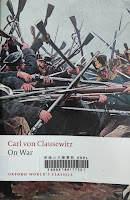Book Name : Civilization And Its Discontents
Author : Sigmund FreudWhat is it about : The Maestro of modern psychology probed this immense topic in an attempt to link logically unhappiness, the ego, the superego, the mass, the society, the individual drivers and the mechanics of present day civilization. Freud's main argument focused on the bounds, constraints and ethics of our civilization which created strains on our individual Pleasure Principle and so that the nature of the "free-self" would clash head-on with the cultural integration of our society - selfishness against altruistic. Freud put forward the ways in which self-happiness could be achieved through sublimation of art, science and work, giving way to our raw instincts and if all else failed, change the world by creating a new world through mass illusion such as religion. In contrary, un-happiness could be related to the power of nature, weakness of body and the state of our society and the sacrifices individuals had been forced to make in compliance to social norms.
Some thoughts after having read the book : Freud's mastery over the subject of Psychology as a whole would be on full display in this classic. Freud's point of view regarding the innate aggression of our species echoed in a distant parallel by the famous Chinese philosopher (荀子 Borne A.D. 316) when he put forward his idea of (性惡論), essentially our species had evolved to be evil from birth and that these instincts would play out in the form of greed, crime and cruelty. Having read the book, I gained a better understanding, at least a "confirmation-of-sort" from a psychological point of view, what I had long suspected - a general sense of disquiet and un-pleasantness when mass gathered together and formed our version of "civilization" which I long felt to be altogether un-natural and most un-civilized and that led the way to all sorts of governance - religious, secular, dictators, democratic, rule-of-law - all trying their best to quash down that inert discontent borne in all of us. Only as a passing jest - I reckoned that our species would just go after each other's blood and fortune at the first sign of the society breakdown and revert to our lawlessness bestial instincts - happened before in our short human history !
Would I recommend this book to you : A tour-de-force in this work of a top intellect done at the height of his powers - theorizing, logical deduction, unique insights into the mechanisms and drives of the individuals and the mass; all done with references to the id, ego, superego and he postulated the mass superego of our society. Surprisingly readable for the author's lucidity in presenting his thesis on this topic. Go read.













